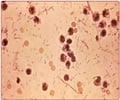Following six months of pain that grew so intense Perline Razanadravao could no longer work, she then eventually decided to go with her equally sick baby to visit a doctor.

She went first to the local health centre near her home village of Lakatu, which sent her to the nearest clinic to her home, the Little Servants of the Sacred Heart of Jesus, run by Catholic nuns on the outskirts of Moramanga, a town in the east of the country.
That meant a six-hour walk, with nine-month-old Jeudi coughing and suffering from diarrhoea along the way.
There, doctors told her that they are part of Madagascar's growing tuberculosis problem.
Last year alone 26,700 people contracted TB, according to the health ministry, a jump of more than 16 percent compared with 2009, when a military coup precipitated an economic crisis as donors suspended aid to one of the world's poorest countries.
Chronic malnutrition and poverty deepened, contributing to the spike in TB, experts say.
Advertisement
Since the army-backed takeover by baby-faced strongman Andry Rajoelina, the economy has yet to regain a peak reached in 2008, with an estimated 200,000 jobs lost.
Advertisement
Veronique Raveloarisoa, 27, who lives in Madagascar's second city Toamasina, a port on the east coast some 350 kilometres (220 miles) from the capital Antananarivo, is relatively fortunate.
But she and her 10-month-old, the youngest of four, also have TB. Like Razanadravao, she also waited until she was too weak to work before visiting a doctor.
Now the $2.0 a day her husband works as a rickshaw driver is their family's sole income.
Raveloarisoa has tea and bread for breakfast, then rice for lunch and supper. Here that is considered a full diet, but doctors say people need better nutrition to fight TB.
"The problems that we are facing are those of nutrition. It's the really poor who get sick and they no longer can work," said Aimee Razoeliarisoa, a doctor at the private Salfa hospital in Toamasina, which is treating more than 400 TB patients.
"But lately we are seeing even teachers, students who catch the disease," she added.
Treatment is arduous. Madagascar follows an eight-month treatment regime that requires daily medical supervision for the first 60 days, and the WHO has persuaded it to adopt a six-month regime, the health ministry said.
The lengthy treatment is a problem for many patients in a nation where 80 percent of the population lives in rural areas, 65 percent of them more than 10 kilometres from health centres, according to the health ministry. Often this distance must be covered on foot because of poor roads and transport.
Nearly five percent of diagnosed cases are fatal. About nine percent of patients stop their treatment early.
Among the few aid agencies still working in Madagascar, the Global Fund to Fight Aids, Tuberculosis and Malaria is providing free TB treatment and helping to improve both public and private hospitals.
Even before the political crisis, Madagascar suffered one of the highest rates of malnutrition in the world. According to the UN children's agency UNICEF, 50 percent of children were chronically malnourished in 2008-09.
The figure has since crept up to 52 percent.
Razanadravao and her daughter have been at the Little Servants of the Sacred Heart of Jesus, which offers free meals and beds in addition to medication, for 10 days.
She must stay for two months of observation, leaving her husband to take care of the house and their two other children.
After that, she will have to complete the six-hour walk every other month for check-ups and to pick up her medication.
Source-AFP












